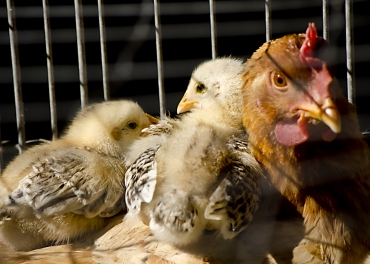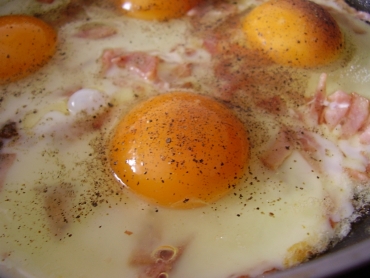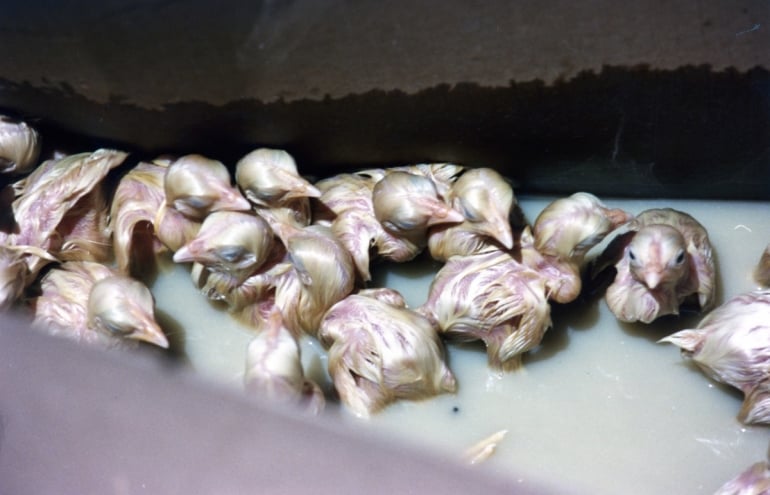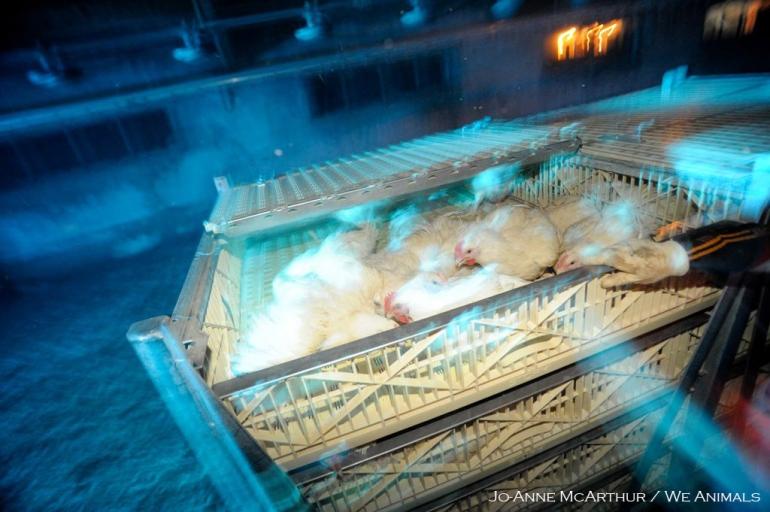Egg-Laying Hens: Mothers, Not Machines
 Chickens are inquisitive, intelligent animals: according to scientists, they are in some respects smarter than cats, dogs and even certain primates. In nature, they live in large social groups with complex hierarchies (a “pecking order”) that reflect their distinct personalities. Yet humans’ taste for hens’ eggs means that millions of these birds spend their entire lives in cramped cages, never able to stretch their wings, breathe fresh air or feel the sun on their backs. They are forced to lay eggs every day until, exhausted, they are sent to their deaths.
Chickens are inquisitive, intelligent animals: according to scientists, they are in some respects smarter than cats, dogs and even certain primates. In nature, they live in large social groups with complex hierarchies (a “pecking order”) that reflect their distinct personalities. Yet humans’ taste for hens’ eggs means that millions of these birds spend their entire lives in cramped cages, never able to stretch their wings, breathe fresh air or feel the sun on their backs. They are forced to lay eggs every day until, exhausted, they are sent to their deaths.
Crowded Cages, Broken Birds
In the UK, hens are kept in misleadingly named “enriched” cages, which are essentially battery cages by another name, giving each bird the equivalent of only three Post-it notes more space than standard battery cages. More than half of all eggs produced in this country come from hens housed in these cruel, claustrophobic conditions.
These birds’ existence is a living hell. The wire mesh of the cages rubs off their feathers, chafes their skin and cripples their feet. Farmers cut off part of their beaks with an infra-red laser when they’re just a few days old to prevent them from pecking each other to death because of the stress of the severe crowding. The hens often suffer from broken bones and osteoporosis, and disease runs rampant in the filthy, cramped sheds. Many birds die, and the survivors are often forced to live with their dead cagemates as their bodies rot.
Male Chicks – Discarded and Killed at a Day Old
Because laying hens aren’t killed outright, some people believe that eating eggs is kinder than eating meat. But consider the fate of 50 per cent of chicks born into the egg industry: because male chicks can’t lay eggs and haven’t been bred to produce excessive flesh for meat, they are regarded as useless and are literally thrown away. And they face a horrific death: they are either tossed into the rubbish and left to suffocate or thrown into a high-speed meat grinder – while they are still alive.
Sentenced to Slaughter
Their mothers and sisters are hardly more fortunate. Although chickens can live for more than a decade, hens raised for their eggs can keep up intensive laying for only about two years. When their production begins to wane, they are shipped off and killed. Shoved into small crates, they endure a harrowing journey to the abattoir. Once there, their legs are shackled and their throats are cut (often while they are still conscious). Their bodies end up as “low-grade” meat such as dog food.
The ‘Free-Range’ Fallacy
Contrary to popular belief, “free-range” does not equal cruelty-free. In most free-range systems, thousands of birds are packed together in sheds where their only access to the outside world is through tiny pop-holes – a far cry from their natural lifestyle. Welfare standards leave much to be desired, and free-range birds actually tend to have a higher mortality rate than ones not labelled “free-range”.
Ultimately, these animals are still treated as no more than egg-laying machines and lead stressful, uncomfortable lives before being killed in the same abattoirs as conventionally reared chickens. There’s no way round it – the only way to help chickens is to stop eating their eggs and their flesh altogether.
How Eggs Can Be Harmful To Your Health

In addition, eggs are a common cause of salmonella and other types of food poisoning and are frequently linked to health scares, whether from poisonous dioxins or listeria – unsurprising, when you consider the horribly unsanitary conditions on factory farms.
Another health worry is the massive overuse of antibiotics in the egg industry. Stuffing chickens with huge doses of drugs is thought to cause dangerous drug-resistant human infections such as E. coli and MRSA.
What You Can Do
It’s easy to turn your back on the callous cruelty of the egg industry – just stop eating eggs! It’s the kindest thing that you can do for chickens, and it’s also a great move for your health. There are plenty of scrumptious substitutes: try a tasty tofu scramble for breakfast, and substitute bananas or applesauce for eggs in your cookies and cakes.
Show that you’re serious about helping chickens by signing the pledge to go vegan – then tell your friends about it and persuade them to follow your example!
FACTBOX
- A hen begins to communicate with her chicks before they even hatch, by clucking to them as she sits on the eggs.
- Chickens comprehend cause-and-effect relationships and understand that objects still exist even after they’re hidden from view. In this respect, they are more cognitively advanced than small human children.
- One large egg contains more than 200 milligrams of cholesterol.
- At least 25,000 people get salmonella in the UK each year.
- New EU legislation in 2012 changed the type of cage that hens may be kept in but didn’t address the fundamental issue of severe crowding. The new, “enriched” battery cages give birds only 9 percent more usable space.



